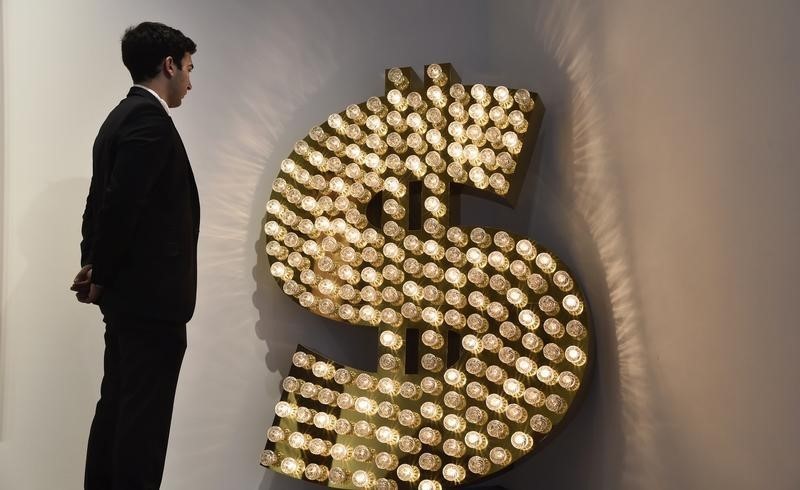By Shinichi Saoshiro
TOKYO (Reuters) - The dollar hovered near five-week highs versus the yen on Tuesday after a top Federal Reserve official added to expectations that U.S. interest rates could be raised as early as September.
The dollar index was little changed at 98.036 (DXY) and near a three-month high of 98.147 scaled overnight.
The greenback received a boost after St. Louis Fed President James Bullard told the Fox Business network on Monday that the central bank is likely to raise rates in September as inflation is set to climb toward its target and unemployment is poised to dip below 5 percent.
U.S. Treasury yields, notably those of shorter-dated maturities like two-year bills, rose in response to Bullard's comments and shored up the dollar.
The dollar was flat at 124.35 yen, not far from a five-week high of 124.39 reached overnight. The greenback still took another step closer to the 13-year peak of 125.86 reached in early June.
The U.S. currency has climbed steeply from a low near 120 yen plumbed at the start of the month when angst over the Greek debt crisis and sliding China shares triggered a rush toward the safe-haven Japanese currency, but the 125 threshold could be a tough ceiling to top.
"The approach to 125 yen takes dollar/yen into politically sensitive territory. Any big gains by the dollar just as the Trans-Pacific Partnership (TPP) talks are climaxing could stimulate those on both sides of the Pacific opposed to the negotiations, and the authorities would not want that," said Junichi Ishikawa, market analyst at IG Securities in Tokyo.
Ministers from the 12-nation TPP trade pact negotiations will meet July 28-31 in Maui, Hawaii, aiming to reach a broad agreement. The meeting is likely to mark the final stage in the TPP negotiations, a massive trade pact covering 40 percent of the world's economy.
REDUCED VOLATILITY
The euro treaded water at $1.0827 <EUR=>. The common currency hit a three-month trough of $1.0808 overnight, slipping steadily after a debt deal that will keep Greece in the euro zone for the time being shifted investor focus back to diverging U.S. and European monetary policies.
The twin themes that kept the markets on edge over the past month - the Greek debt saga and turbulence in Chinese equities - have gone on the back burner for now, as reflected in part by the decline in implied volatility.
Bets on how volatile eight major G10 currency crosses will be over the next three months are at the lowest since the Swiss National Bank removed the euro/Swiss franc floor in January, Steven Englander, global head of G10 FX strategy at CitiFX in New York, wrote.
Three-month sterling/dollar implied volatility <GBP3MO=R> was roughly at its lowest since January, while that of the euro/dollar <EUR3MO=> was near a 4-1/2-month low. Dollar/yen implied volatility <JPY3MO=> recently hit its lowest since early May.
"It is a clear signal that investors expect a quiet summer, but may also tell you something about the memory span of FX investors," Englander said.
"We think that what has happened is that the threat of an immediate rupture has dropped out of asset market pricing. What is not getting priced in is the rising risk that we see a renewed USD upward trend."
The New Zealand dollar kept its distance from six-year lows against the dollar after comments overnight by Prime Minister John Key gave the battered kiwi breathing space.
Although the Reserve Bank of New Zealand is still expected to cut rates when it meets Wednesday, Key's comments that the kiwi's 25 percent slide in the past year was faster than expected gave the market pause for thought.

The kiwi was up 0.4 percent at $0.6594 <NZD=D4> after touching $0.6498 last week, its lowest since July 2009.